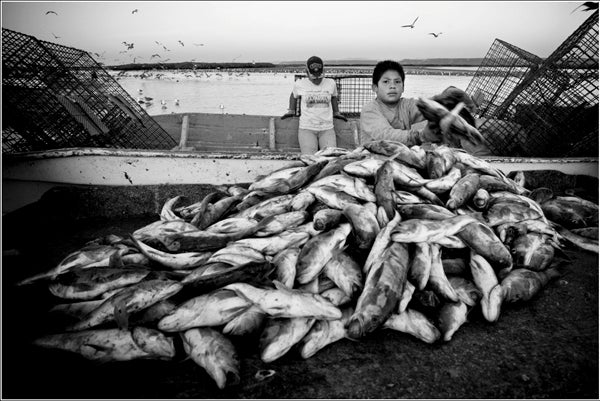|
March 18, 2014
Trash to treasure: Stanford researcher tells a seafood story
Support for sustainable fisheries project will also save endangered loggerhead turtles and boost incomes. By Rob Jordan

Fishermen in Mexico's Sea of Cortez are learning sustainable practices from a Stanford researcher that will eventually enable them to stop the vicious cycle of overfishing and the resultant high volume-low quality approach, while still making a living. (Photo: Alejandro Rivas)
When Hoyt Peckham was still a teenager, he went on the adventure of a lifetime. While sailing around the Pacific studying whales, the aspiring marine biologist fell in love with Mexico's Sea of Cortez and vowed to come back someday.
He returned years later to conduct doctoral research on loggerhead turtles. But Peckham, now a visiting fellow at the Center for Ocean Solutions, had a rude awakening. Fishermen were unintentionally slaughtering the endangered sea turtles. Because they used hooks that caught turtles as well as fish, local fishermen were killing about 1,000 loggerheads a year – as many as were killed by the entire North Pacific fishing fleet. On top of that, local fisheries were in a race to the bottom, fishing more and more for fish of lower and lower value, due to poor handling practices, among other factors. Some fish were worth significantly less than the redemption value of discarded plastic bottles.
"It's a kind of reverse alchemy," Peckham said recently. "They were taking fish that could be worth gold, and inadvertently turning them into trash."
Seeing a need, Peckham built an ambitious social-and-commercial enterprise that enables small-scale fishermen to transition to more sustainable fishing practices and ensures higher market prices. The initiative, SmartFish, recently received a boost when Peckham was awarded a prestigious $150,000 Pew Fellowship in Marine Conservation.
Making turtles safe
When Peckham started working with small-scale fishermen in Baja California more than 10 years ago, he was stunned by the variety of sea life he saw. A unique upwelling of nutrients makes the area a prime feeding ground for swordfish, tuna, sharks, mahi mahi and other highly sought-after fish. Living among the local communities and joining fishermen on their deep-sea forays, Peckham quickly saw how turtle by-catch was not only harmful to the species, but also to fishermen's wallets. Each turtle caught meant the potential loss of a more valuable seafood commodity, wasted time and damaged gear.
"There were strong motivations for them to reduce their by-catch," Peckham said.
Harnessing that motivation, Peckham consulted with local fishing cooperatives about fishing gear that could reduce by-catch without reducing overall hauls. Working through the Mexican nonprofit Grupo Tortuguero de las Californias, Peckham built a team to combine participatory research with social marketing, presenting fishing education programs in local schools and offering outreach thorough public murals, comic books and free film nights.
He financed and then led exchange programs to take fisher-leaders to Japan and Hawaii to see more sustainable fishing practices and the high prices they commanded for fish. Eventually, leaders of local fishing co-ops decided to replace bottom-set long lines and gill nets with more turtle-friendly gear and to avoid turtle hotspots.
"He had identified and solved a real-world problem," said Larry Crowder, a Stanford Woods Institute senior fellow and science director of the Center for Ocean Solutions who carries out research with Peckham on how social and economic systems interact with the biophysical system that produces fish. "Most people don't do that in a lifetime."
From turtles to fishermen
Recently, Peckham expanded his focus from reducing by-catch to actually improving fisheries – specifically their value and sustainability. In many cases, fish caught in bottom-set nets and lines "stew" underwater overnight, and the value of fish plummets because of a lack of on-board ice storage, poor handling and processing, and a lack of ways to coordinate sales with potential buyers. To compensate for low fish prices, many fishermen are forced to increase their catch, which only worsens the situation. "This all results in a vicious cycle of overfishing," Peckham said. "Obviously, that's got to be interrupted."
Ironically, nearby Los Cabos in Baja California is full of high-end hotels and restaurants that would gladly pay a premium for high-quality local fish, but instead are forced to import seafood. To seize the opportunity, Peckham created SmartFish to help fishermen keep their catch fresh and sell at top dollar, letting them earn more while fishing less.
SmartFish does this in partnership with strong, transparent fishing cooperatives, nongovernmental organizations and government agencies by ensuring the use of ocean-friendly practices such as hand lines and traps that catch fish alive, helping fishermen purchase and install ice for on-board fish storage, and building and renovating processing plants, among other improvements. Peckham and his SmartFish team work only with fisheries that can qualify as sustainable by independent, international standards, in many cases helping fishermen switch away from vulnerable fish to more resilient ones.
SmartFish also cultivates demand through promotions at international gourmet events, by negotiating prices and, when necessary, directly buying and selling responsibly caught seafood. Peckham will use his Pew Marine Fellowship to evaluate the scaling of SmartFish and its model of "locally derived, locally feasible solutions" beyond Mexico.
"People have it in their minds that what's good for the environment isn't good for people," Crowder said. "Hoyt's project is a win-win."
Rob Jordan writes for the Stanford Woods Institute for the Environment.
For more Stanford experts on the environment and other topics, visit Stanford Experts.
-30-
|